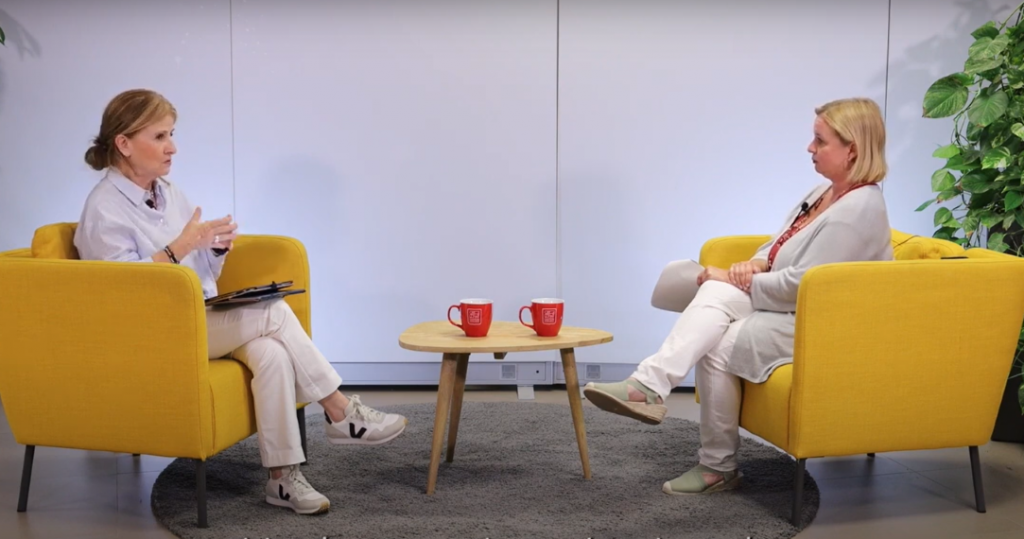
En la última edición de nuestra Escuela de Padres, Silvia Sanchis y Cristina Pérez, miembros del gabinete psicopedagógico del colegio, ofrecieron unas pautas educativas para que los padres trabajen desde casa la autonomía y responsabilidad personal de sus hijos.
A continuación, destacamos algunos de los puntos más relevantes de su charla.
- La responsabilidad no se debe confundir con la obediencia. Es un valor que está relacionado con la conciencia y nos permite valorar las decisiones que tomamos y estar dispuestos a aceptar las consecuencias.
- Desarrollar la responsabilidad es un proceso largo que empieza en casa y se extiende en diferentes aspectos de la vida. Como familias, tenemos que educar a los niños en este aspecto.
- Para educar en el valor de la responsabilidad, las familias tenemos que ser un ejemplo para nuestros hijos y ser conscientes de nuestras acciones y las consecuencias que puedan tener. Tenemos que respetar las normas y ser la mejor versión de nosotros mismos.
- Es fundamental educar a los niños para que entiendan que sus decisiones no sólo les afectan a ellos, sino a los demás también, y que deben ser responsables por el bien común.
- Educar la responsabilidad tiene unos beneficios importantes para los niños: una mayor autoestima, confianza en sí mismos, el desarrollo de buenos hábitos y la tolerancia de la frustración cuando las cosas no salen como ellos quieren.
- Hay que empezar a educar la responsabilidad desde edades tempranas, comenzando con pequeños deberes y tareas, por ejemplo de orden e higiene personal. Después pueden asumir mayores responsabilidades, como sus deberes escolares o la preparación de una comida sencilla. Es importante que entiendan que no deben dejar que nadie haga por ellos lo que son capaces de hacer por sí mismos.
- Cuando se convierten en adolescentes, la responsabilidad que hayan adquirido les ayuda a respetar los límites que han marcado sus padres.
- Es importante que los niños entiendan cuáles son nuestras expectativas, por lo que hay que explicarlas con claridad.
- La voluntad es un valor que es fundamental desarrollar en los niños porque no siempre van a sentirse motivados a llevar a cabo alguna responsabilidad. Tienen que entender que forman parte de una sociedad en la que han de colaborar.
- Como padres, tenemos que ser tolerantes de las posibles equivocaciones de nuestros hijos y de su frustración. Tenemos que dejar que aprendan de sus errores para que puedan desarrollar su propio sentido de la responsabilidad.
In their recent edition of our Parent School, the Primary and Secondary Psychologists, Silvia Sanchis and Cristina Pérez, gave a series of recommendations for parents to help their children grow in self-sufficiency and personal responsibility. Please find below some of the most relevant points they made in their talk.
- Responsibility should not be confused with obedience. It’s a value that’s related to a person’s conscience and that allows us to evaluate the decisions that we make and be prepared to accept the consequences.
- Developing responsibility is a long process that starts at home and then extends to other areas in a child’s life. As parents, we must educate our children in this area.
- To teach the value of responsibility, at home we have to be an example for our children and be aware of our actions and the consequences they may cause. We must follow the rules and be the best possible version of ourselves.
- It’s essential to teach children to understand that their decisions don’t only affect them, but also others, and that they should be responsible in the interests of the common good.
- Teaching the value of responsibility has important benefits for children: better self-esteem, self-confidence, developing good habits and tolerating frustration when things don’t go as they wished.
- It’s fundamental to teach responsibility from an early age, starting with small chores and tasks, for example regarding tidiness and personal hygiene. Later children can take on greater responsibilities, such as for their homework or preparing a simple meal. It’s important for them to understand that they shouldn’t let anyone do something for them that they can do for themselves.
- When children become adolescents, the responsibility they have developed will help them to respect the limits that parents set for them.
- It’s important for children to understand what our expectations are, which is why we must explain them clearly.
- One value that is fundamental for children is will. They are not always going to feel motivated to fulfil a responsibility, but they must understand that they are part of a society in which they must collaborate.
- As parents, we must be tolerant of our children’s errors and their frustration. We must allow them to learn from their mistakes so that they can develop their own sense of personal responsibility.











Leave a Reply